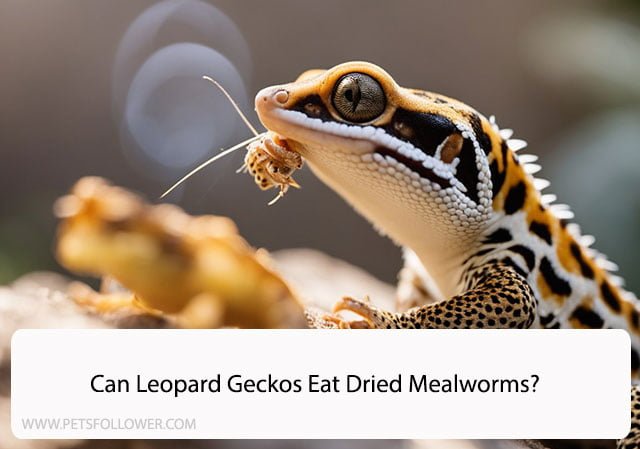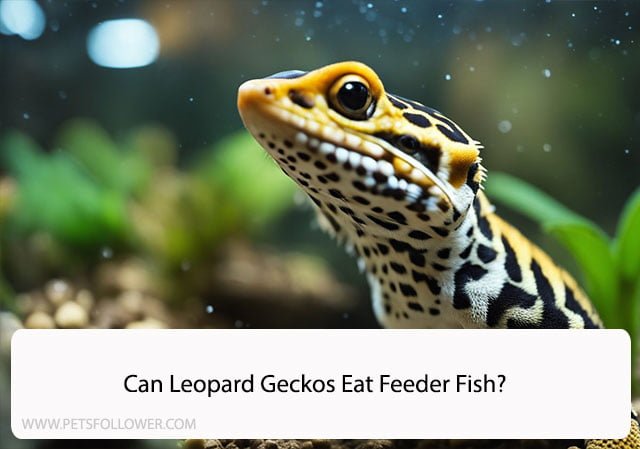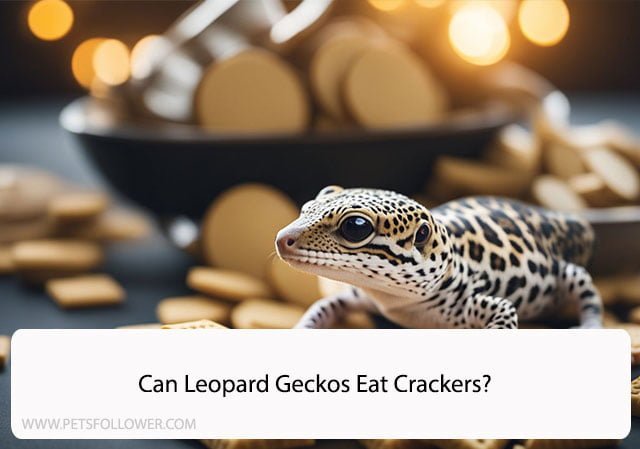Leopard geckos are fascinating creatures that make great pets due to their docile nature and low maintenance requirements. As with any pet, it is important to provide them with a balanced diet to ensure their health and well-being. While leopard geckos are primarily insectivores, many owners wonder if they can also eat other types of food, such as meat.

The question of whether leopard geckos can eat meat is a common one among pet owners. While some sources suggest that they can eat meat, others caution against it, stating that a diet high in protein can be harmful to these reptiles. As with any pet, it is important to do your research and consult with a veterinarian or experienced breeder before making any changes to your leopard gecko’s diet. In this article, we will explore the topic of whether leopard geckos can eat meat, and provide you with the information you need to make an informed decision about feeding your pet.
Leopard Gecko Dietary Basics

Leopard geckos are insectivores, which means that they primarily eat insects. However, they also require a balanced diet to ensure they receive all the necessary nutrients. In this section, we will discuss the nutritional requirements and feeding habits of leopard geckos.
Nutritional Requirements
Leopard geckos require a balanced diet that consists of protein, fat, vitamins, and minerals. The following table shows the nutritional requirements of leopard geckos:
| Nutrient | Requirement |
|---|---|
| Protein | 28-35% |
| Fat | 10-15% |
| Calcium | 2:1 ratio with phosphorus |
| Vitamin D3 | 200-400 IU/kg |
| Vitamin A | 500-1000 IU/kg |
Leopard geckos require a high amount of protein in their diet to support their growth and development. They also need calcium and vitamin D3 to maintain healthy bones and prevent metabolic bone disease. Vitamin A is essential for maintaining healthy skin and eyes.
Feeding Habits
Leopard geckos are nocturnal, which means they are active at night. They are also opportunistic feeders, which means they will eat whenever they have the chance. In captivity, leopard geckos should be fed a variety of insects such as crickets, mealworms, and waxworms. It is important to feed them appropriately sized prey to prevent choking and digestive issues.
Leopard geckos should be fed every other day, and their food should be dusted with calcium and vitamin D3 supplements to ensure they receive all the necessary nutrients. It is also important to provide a shallow dish of water at all times to prevent dehydration.
In conclusion, leopard geckos require a balanced diet that consists of protein, fat, vitamins, and minerals. They should be fed a variety of appropriately sized insects and their food should be dusted with calcium and vitamin D3 supplements. By following these dietary guidelines, we can ensure that our leopard geckos remain healthy and happy.
Understanding Red Meat for Reptiles

Red Meat Properties
Red meat is a popular food choice for many reptile owners, including leopard gecko keepers. Red meat is a great source of protein and nutrients, but it’s important to understand the properties of red meat before feeding it to your leopard gecko.
When it comes to red meat, it’s important to choose lean cuts to avoid excess fat and cholesterol. Some good options include lean beef, venison, and lamb. It’s also important to avoid processed meats, such as sausage and deli meats, as they can contain additives and preservatives that are harmful to your leopard gecko.
Another important consideration is the size of the meat. Red meat should be cut into small, bite-sized pieces that are easy for your leopard gecko to swallow. Large pieces of meat can cause choking or digestive issues.
Health Implications
While red meat can be a nutritious addition to your leopard gecko’s diet, it’s important to be aware of the potential health implications. Excessive consumption of red meat can lead to obesity, which can lead to a variety of health problems, including heart disease and diabetes.
It’s also important to note that some leopard geckos may have difficulty digesting red meat. If your leopard gecko experiences digestive issues, such as constipation or diarrhea, after consuming red meat, it may be best to avoid feeding it to them in the future.
Overall, red meat can be a healthy and nutritious addition to your leopard gecko’s diet when fed in moderation and with appropriate precautions. As with any food, it’s important to monitor your leopard gecko’s health and adjust their diet as necessary.
Risks of Feeding Red Meat to Leopard Geckos
When it comes to feeding leopard geckos, it’s important to provide them with a balanced and nutritious diet. While many owners may consider feeding their geckos red meat, there are several risks associated with this type of diet.
Digestive Issues
Leopard geckos have a delicate digestive system that may not be able to handle red meat. Red meat is high in fat and protein, which can be difficult for geckos to digest. This can lead to digestive issues such as constipation, diarrhea, and even impaction.
Nutritional Imbalance
While red meat may be high in protein, it may not provide the necessary vitamins and minerals that leopard geckos need to thrive. Feeding a diet that is high in red meat can lead to a nutritional imbalance, which can cause health problems down the line.
Potential Toxins
Red meat may contain hormones, antibiotics, and other toxins that can be harmful to leopard geckos. These toxins can build up in the gecko’s system over time and cause serious health problems.
Overall, feeding red meat to leopard geckos is not recommended. It’s important to provide your gecko with a balanced and nutritious diet that meets their specific dietary needs. If you have any questions or concerns about your gecko’s diet, it’s best to consult with a veterinarian or a reptile nutrition expert.
Safe Foods for Leopard Geckos
Leopard geckos are carnivorous reptiles and require a diet consisting primarily of insects and worms. However, not all insects and worms are safe for leopard geckos to consume. In this section, we will discuss safe foods for leopard geckos, including insects and worms, commercial diets, and occasional treats.
Insects and Worms
Leopard geckos enjoy a variety of insects and worms, including crickets, mealworms, superworms, and waxworms. However, it is important to ensure that these insects and worms are gut-loaded with nutritious food before feeding them to your leopard gecko. Gut-loading involves feeding the insects and worms a nutritious diet, such as fruits and vegetables, before feeding them to your leopard gecko. This ensures that your leopard gecko receives all the necessary nutrients.
It is also important to dust the insects and worms with calcium and vitamin D3 supplements before feeding them to your leopard gecko. This helps prevent calcium deficiency, which can lead to metabolic bone disease.
Commercial Diets
Commercial diets, such as canned insects and meal replacement powders, can be a convenient option for feeding your leopard gecko. However, it is important to choose high-quality, nutritionally complete diets that are specifically formulated for leopard geckos.
Occasional Treats
Leopard geckos can enjoy occasional treats, such as pinkie mice, but these should not make up a significant portion of their diet. It is important to ensure that the pinkie mice are appropriately sized for your leopard gecko and are fed in moderation.
In conclusion, leopard geckos require a diet consisting primarily of insects and worms, but can also benefit from commercial diets and occasional treats. It is important to ensure that all foods are nutritionally complete and appropriately sized for your leopard gecko.
Feeding Techniques
Portion Control
When feeding leopard geckos, it is important to ensure that they are receiving the appropriate portion sizes. Overfeeding can lead to obesity and other health issues, while underfeeding can result in malnutrition. A good rule of thumb is to offer prey items that are no larger than the width of the gecko’s head.
To help with portion control, it may be helpful to pre-portion food items before feeding. This can be done by purchasing appropriately sized prey items or by cutting larger items into smaller pieces. It is also important to monitor the gecko’s weight regularly to ensure that they are maintaining a healthy body condition.
Frequency of Feeding
Leopard geckos are typically fed every 2-3 days. However, the frequency of feeding may vary depending on the age and size of the gecko, as well as their individual metabolism. Younger geckos may require more frequent feedings, while older geckos may require less.
It is important to provide a varied diet for leopard geckos to ensure that they are receiving all of the necessary nutrients. This can include a variety of live prey items such as crickets, mealworms, and waxworms. It is also important to dust prey items with a calcium supplement to prevent calcium deficiencies.
Overall, proper feeding techniques are essential for the health and well-being of leopard geckos. By ensuring appropriate portion sizes and feeding frequency, as well as offering a varied diet and supplementing with calcium, we can help our geckos thrive.
Alternatives to Red Meat
Protein Sources
While red meat is a good source of protein for leopard geckos, there are other protein sources that can be used to provide a well-balanced diet. Insects such as crickets, mealworms, and waxworms are good sources of protein and can be easily found at pet stores. Other options include pinkie mice, which are young mice that have not yet grown hair and are a good source of protein and fat.
Vegetable and Fruit Options
In addition to insects and pinkie mice, there are also vegetable and fruit options that can provide important nutrients for leopard geckos. Some good options include leafy greens such as collard greens, kale, and spinach, as well as fruits like mango, papaya, and figs. These foods can be chopped up and added to a gecko’s diet to provide variety and important vitamins and minerals.
Overall, while red meat is a good protein source for leopard geckos, there are many other options available that can provide a well-balanced diet. By incorporating a variety of protein sources, vegetables, and fruits into a gecko’s diet, we can ensure that they are getting all the nutrients they need to stay healthy and happy.
Monitoring Your Leopard Gecko’s Health
Weight Tracking
Keeping track of your leopard gecko’s weight is an important part of monitoring their health. We recommend weighing your gecko regularly and recording their weight in a logbook. This will help you keep track of any changes in weight, which can be an indicator of potential health issues.
To weigh your leopard gecko, place them in a small container or on a scale specifically designed for weighing reptiles. Make sure to subtract the weight of the container or scale from the total weight to get an accurate reading.
It’s important to note that leopard geckos can experience weight fluctuations due to shedding or changes in diet. However, if you notice a significant and consistent decrease in weight, it’s best to consult with a veterinarian.
Behavioral Signs
In addition to weight tracking, monitoring your leopard gecko’s behavior can also provide valuable insight into their health. Here are some behavioral signs to look out for:
- Appetite: A healthy leopard gecko should have a good appetite. If you notice a decrease in appetite, it could be a sign of illness or stress.
- Activity level: Leopard geckos are generally active at night and should be observed moving around their enclosure. A decrease in activity could indicate a health issue.
- Shedding: Leopard geckos shed their skin regularly. However, if shedding seems to be taking longer than usual or if there are any issues with the shed, it could indicate a health problem.
- Defecation: Regular and healthy bowel movements are a good sign of overall health. Any changes in frequency or consistency should be noted.
By regularly monitoring your leopard gecko’s weight and behavior, you can catch any potential health issues early on and ensure that your gecko stays healthy and happy.
Frequently Asked Questions
What alternative food sources are appropriate for leopard geckos?
Leopard geckos are primarily insectivores, so it is best to feed them a diet of live insects. Some appropriate insect options include crickets, mealworms, and dubia roaches. It is important to make sure the insects are appropriately sized for your gecko and to dust them with calcium and vitamin supplements.
Are there any vegetables that are safe for leopard geckos to consume?
While leopard geckos are not typically known for eating vegetables, some safe options include carrots and squash. However, these should only be given as occasional treats and should not make up a significant portion of their diet.
What is the natural diet of leopard geckos in the wild?
In the wild, leopard geckos primarily feed on insects such as crickets, beetles, and grasshoppers. They may also consume small lizards and other invertebrates.
Is it safe for leopard geckos to eat mealworms as part of their diet?
Mealworms can be a safe and nutritious part of a leopard gecko’s diet, but they should not be the sole source of food. It is important to make sure the mealworms are appropriately sized and to dust them with calcium and vitamin supplements.
What types of meat should be avoided in a leopard gecko’s diet?
Leopard geckos should not be fed any type of mammal meat, such as beef or chicken. This type of meat is too high in fat and does not provide the necessary nutrients for a gecko’s diet.
Can leopard geckos have fruits included in their feeding regimen?
While fruits are not a necessary part of a leopard gecko’s diet, they can be given as occasional treats. Safe options include small amounts of diced apple or banana. However, fruits should not make up a significant portion of their diet and should be given in moderation.











